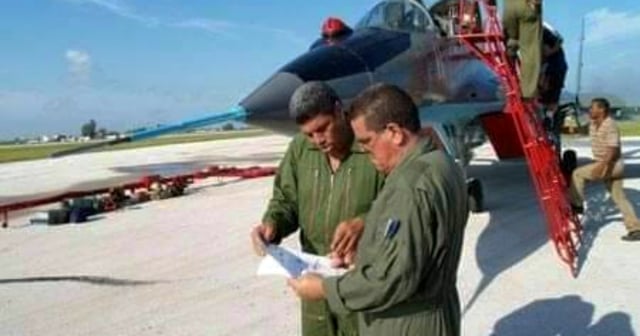Leaders of the Cuban exile community in Miami have intensified their efforts to investigate former Cuban pilot Luis Raúl González-Pardo Rodríguez, accused of having participated in the downing of the airplanes belonging to the organization Brothers to the Rescue in 1996.
During a press conference held this Monday at the American Museum of the Cuban Diaspora in Miami, they requested local and state authorities to review the gathered evidence and consider opening a formal case against González-Pardo.
Nelson Morales, a relative of one of the victims, expressed that 28 years later he is still seeking justice for the death of his brother Pablo Morales, who was one of the four people killed in the attack carried out by pilots of the Cuban regime in international waters of the Florida Strait.
"They crushed him. That is the greatest murder that could have happened. Nothing was left there," said Morales, visibly moved.
Exile leaders are urging the Miami-Dade and Florida state prosecutor's office to form a grand jury to investigate the case.
Marcell Felipe, president of the American Museum of the Cuban Diaspora, stated that this is the right time to act.
"With the federal government ready to intervene, now is the time to push this issue forward and follow the law," he said.
González-Pardo, who according to exile leaders currently resides in Florida, has denied the accusations.
However, researcher Luis Domínguez from the Foundation for Human Rights in Cuba (FHRC) claims to have evidence supporting González-Pardo's involvement in the incident, including information from other pilots.
Although Domínguez did not present all of his evidence, he maintained that González-Pardo admitted his involvement in a conversation with the former Cuban pilot Orestes Lorenzo.
Currently, there is an open court case against Rubén Martínez Puente, who at that time was the commander of the Cuban air force and supervised the pilots involved in the shootdown.
However, neither he nor the Pérez brothers - also involved - were extradited to the United States, and two of them have already passed away. González-Pardo, for his part, has never been formally charged.
Lawyer Nelson Rodríguez Varela explained that, although the downing occurred in international waters, the state of Florida could have jurisdiction if any part of the conspiracy took place on its territory.
During the press conference, state representative Alex Rizo reported that he has contacted the governor of Florida to address the issue, while Kevin Cabrera, commissioner of Miami-Dade, stated that he will seek the necessary support for the authorities to take action.
Héctor Lans, a businessman and member of the Cuban exile community, emphasized that beyond the legal impact, this case has a strong moral component: "It is a mission that every dignified Cuban must support."
It was in mid-September that it was revealed that Luis Raúl González-Pardo Rodríguez, allegedly involved in the downing of two planes from Hermanos al Rescate, was residing in the United States thanks to the humanitarian parole implemented by the administration of President Joe Biden.
Retired with the rank of colonel, González-Pardo was part of the Anti-Air Defense and Revolutionary Air Force (DAAFAR) and participated in the shooting down of the Brothers to the Rescue planes in 1996, an event in which the Cuban-American pilots, Mario Manuel de la Peña (24 years old), Armando Alejandre (45), Carlos Costa (29), and the Cuban resident Pablo Morales (29) lost their lives.
The alleged arrival in the United States as a beneficiary of the humanitarian parole program of one of those involved in that crime occurs at a time when the Cuban exile community in that country and Cuban-American congressmembers have raised alarms about the increasing number of repressors and leaders of the Cuban regime who are arriving or residing in U.S. territory.
Retired Colonel González-Pardo would be living in Jacksonville - where he would be working in a bakery - and where his daughter also lives. According to Martí Noticias, his wife is still in Cuba waiting for her visa to join him.
Although he would not have been directly responsible for the missile fire that brought down the two planes on February 24, 1996, the pilot would have taken off that day and pursued the third aircraft, piloted by the organization's leader José Basulto and Arnaldo Iglesias, which also carried the leader of the M.A.R organization, Silvia Iriondo, and her husband Andrés, who managed to escape.
González-Pardo was one of the pilots of the MiG-29A 911 who pursued Basulto's plane along with another pilot of the Cuban regime, Raúl Simanca Cárdenas. This was stated by Luis Domínguez from the Human Rights Foundation.
Social media posts would reveal their loyalty to the regime of the former military man, even after their alleged residency in the United States.
After his retirement, González-Pardo held important positions in Cuban civil aviation, including the role of deputy chief of Terminal 4 of the José Martí International Airport in Havana, also known as the International Cargo Terminal, operated in collaboration between Cuban and Spanish companies.
What do you think?
COMMENTFiled under:
